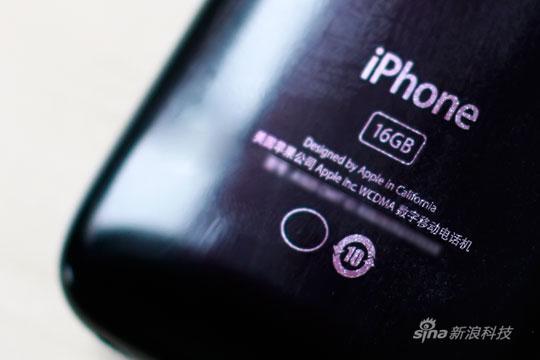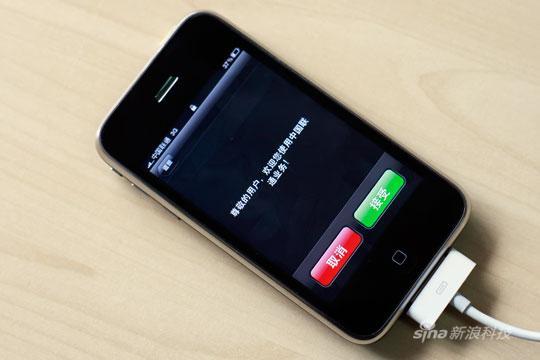The new iPhone is reportedly a GSM/WCDMA model that operates on the 900MHz, 1700MHz and 1900MHz bands. It also includes Bluetooth, but no Wi-Fi. It was approved on May 7, according to a China's State Radio Regulatory Commission filing discovered by Engadget. The phone has been approved for use in China for the next five years.
This week, reports surfaced that suggested a deal had been reached between Apple and China Unicom, but officials close to the matter quickly intervened to say the deal was not final.
News on the phone from China, as translated by iPhoneinChina.com, suggests the new model could fall under the Unicom WCDMA standard.
China Unicom runs a GSM/UMTS 3G mobile network using the same signaling technology at AT&T in the U.S. and most other carriers worldwide. Existing iPhone models are already compatible with China Unicom's network, though WCDMA is a third-generation GSM technology.
Pictures of the new Chinese iPhone show a 16GB model that operates on the 3G spectrum. The Hong Kong model includes English text on the back, and says the model is WCDMA .
Details of the China Unicom deal leaked this week reportedly set a minimum threshold of CNY 5 billion ($731 million) in iPhone sales, guaranteeing orders of one to two million devices per year. The source said China Unicom could begin selling the iPhone as early as late September. China Unicom is also rumored to pay Apple 3,000 CNY ($439) per unit and price it below that for customers, Unicom promises to sell a minimum 1 million units per year, and the Chinese iPhone will access "Apple's China App Store."
In February, China Unicom was fingered as Apple's most likely partner by British consulting firm Ovum, followed by a leak of iPhone information inadvertently posted by China Unicom's website and an admission by the company that it was in talks with Apple in March. Earlier this month, Analyst Shaw Wu of Kaufman Bros. similarly claimed that China Unicom would be the frontrunner in marketing Apple's phone in the country.
With over 135 million subscribers as of February 2009, China Unicom is 170% larger in terms of users than AT&T in the US, but it is still China's second largest mobile carrier after the state-owned giant China Mobile, which boasts 471 million subscribers, making it the world's largest carrier by number of subscribers.
The vast size of the Chinese market has kept observers intently interested in how and when Apple would officially enter the market with the iPhone. On its recent earnings call, Apple executives only said they planned to begin selling the iPhone within the next year and described the negotiations as a "priority project." That may have been cover to keep its negotiations productive as Apple pitted the Chinese carriers against each other to gain the best deal.
In addition to phone network compatibility, China Unicom may be more open to allowing Apple to run its own software store and retain control over iPhone features such as WiFi and Bluetooth. In contrast, China Mobile has expressed an unwavering demand to exclusively operate its own mobile software store, a stance also adopted by Verizon in the U.S.
 Slash Lane
Slash Lane








-m.jpg)






 Charles Martin
Charles Martin
 Marko Zivkovic
Marko Zivkovic
 Andrew Orr
Andrew Orr
 Amber Neely
Amber Neely

 William Gallagher and Mike Wuerthele
William Gallagher and Mike Wuerthele










31 Comments
Excuse my ignorance, but why not Wi-Fi?
Because they don't want to let people sharing informations in P2P mode.
This decision is political... sms, email, everything should be filtered.
Excuse my ignorance, but why not Wi-Fi?
I am thinking AAPL might benefit from a billion sales ...
Also will be nice to see a US product (albeit made in China) sell in China in volume. Maybe Apple can help close that trade gap.
I am wondering if it makes sense to invest in China Unicom ADR (CHU). Right now, China Mobile has the largest customer base with its GSM network that will be upgraded to their version of 3G called TD-SCDMA. This standard is used in China only and was created to bypass QCOM CDMA and UMTS patents. I am not sure the network tech is stable enough, especially the handsets. More likely, the selection of handsets will be limited and at a higher price.
It does look like CHU would have the technology advantage and now they are likely to go with the iPhone. As we know, the iPhone has been driving subscriber growth at ATT and other carriers. It could do the same for CHU. Like the article says, CHL has 3.1x the subs of CHU. PSR for CHU is 3.5, versus 1.45 for CHU. Also big difference in gross margins.
I know I am missing something... any opinions here?
Because they don't want to let people sharing informations in P2P mode.
This decision is political... sms, email, everything should be filtered.
I wonder how much fascism will creep into the "China App Store"?
For instance even though the developers have yet to make any decent programs that use it, iPhones are aware of each others existence and could easily exchange information over bluetooth if the software was written for it. In the case of a government crackdown a sort of daisy-chain among sympathetic iPhone carriers with the right software could transfer information and pictures out of the massacre and distribute them widely.
Total dumb-ass move from a "we need to develop our country" point of view forcing Wi-Fi off the device also. If millions of citizens used Wi-Fi it would drive the adoption of the technology and sales of routers etc.